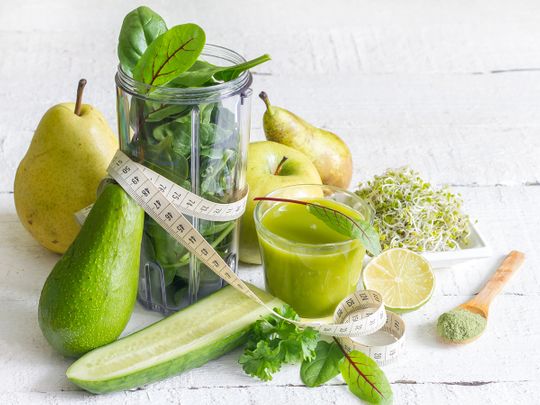
Let’s face it: Summer is the easiest time to fall off the healthy eating bandwagon. All those holiday meals and beachside barbecues eventually take their toll, so it’s no wonder that weight loss becomes a priority on our return to work. Enter the restrictive detox diet, with its promise of quick results. How many of you have saved Beyoncé’s 22 Days Nutrition plan with a view to embarking on the restrictive eating pattern? Or maybe it’s the charcoal detox that’s got you burning up the interwebs?
But while detox and fad diets may offer short-term benefits in terms of water or lean muscle loss, the weight will pile back on soon enough. Cutting out entire food groups, or avoiding food entirely on liquid cleanses, is both unhealthy and difficult to maintain, and ultimately sets you up for failure.
About 98 per cent of people who lose weight on fad diets will regain it within about five years, Boston University School of Medicine research shows. In a 2017 article on fad diets, Cleveland Clinic said, “All [fad diets] have one thing in common: a temporary solution to what for many people is a lifelong problem. Once the diet is stopped, the lost weight is usually regained quickly, since none of the diets teach behaviour modification.”

Mindful eating and portion control is essential to ensure healthy eating habits.
“There is no doubt that sustained healthy habits are of greater long-term value than the quick fixes offered by commercial detox diets,” explains Farheen Dhinda, Clinical Dietitian at DHA. She emphasises the need for a holistic approach to food and exercise. “It is important to remember that a healthy diet and lifestyle should not be a seasonal occurrence in one’s life, but rather practiced all year round.”
Here, Better Health offers six tips for those looking to embark on a healthy weight-loss regimen. Embrace them with a regular exercise and movement routine and you’ll see lasting effects quickly.
1 Cook at home
A 2017 British study found that eating home-cooked meals more frequently was associated with greater adherence to healthy eating plans such as the DASH and Mediterranean diets, as well as greater fruit and vegetable intakes. “Eating home-cooked meals more frequently was significantly associated with several markers of cardio-metabolic health, including lower likelihood of having an overweight BMI, and lower likelihood of excess percentage body fat,” Newcastle University researcher Susanna Mills and her colleagues wrote in their paper, published in the International Journal of Behavioral Nutrition and Physical Activity. In fact, those who ate home-cooked meals more than five times a week were 28 per cent less likely to be overweight, and 24 per cent less likely to have excess percentage body fat, the study found. In other words, we know what we should be eating, and cooking our own food allows us to monitor what goes onto our plates and into our stomachs.
2 Focus on fibre
High-fibre diets have been trending recently and with good reason. Fibre helps keep our digestive system healthy and prevent constipation by moving waste through the digestive tract more quickly. Adding fibre-rich foods in a healthy balanced diet can improve weight maintenance, according to recommendations from the European Food Safety Authority. The British Nutrition Foundation says dietary fibre can reduce your risk of heart disease, stroke, type 2 diabetes and bowel cancer, as well as help gut bacteria produce beneficial biochemicals. Incorporating foods such as cruciferous green and leafy vegetables, whole grains, legumes, nuts and fruits into your diet will up your fibre intake.
3 Practice mindful eating
Nutritionists now advise eliminating distractions at meal times, and staying alert and aware of the taste of each food, your feelings and your body’s physical cues. “Mindful eating and portion control is essential to ensure healthy eating habits,” Dhinda says. “It is important to have a positive relationship with food and avoid associating any negative connotations to food. Enjoy the meal that you eat and avoid distractions at the dining table like phones, tablets and so on.”
4 Drink more water
People often mistake dehydration for hunger, so staying adequately hydrated will help you avoid excessive food consumption. A rough estimation of your water requirements would be to simply divide your body weight by 30. So if you weigh about 60kg, you’ll need a minimum of two litres per day. One way to stay hydrated is to set a large refillable bottle on your desk, and monitor how often you refill it during the day. You can also consume foods with high water content such as strawberries and watermelon.
5 Consume less sugar
From January 1 2020, the UAE will place a tax of 50 per cent on sugary drinks. The reason for this is to improve the nation’s health. Last year, a report by the UK insurance provider Proctectivity estimated that UAE residents consume an average of 103 litres of sugary drinks each year.
Excessive consumption of sugar can lead to multiple health issues, ranging from tooth decay and obesity to cardiovascular disease and diabetes.
One simple way to way to reduce your sugar intake is to ditch the sugary sodas. Avoiding processed foods with large amounts of added sugars, such as ketchups and sugary desserts, and switching to whole foods, which aren’t ultra-processed, will also considerably reduce your sugar consumption.
6 Move, move, move
The benefits of exercise on overall health have been repeatedly reported, with daily physical activity linked to benefits such as improved mood, greater energy, stronger muscles and bones, and a reduced risk of several chronic diseases, including diabetes and cardiovascular disease.
“Choose an exercise or sports activity that you enjoy,” Dhinda says. “It could even be dancing.”












